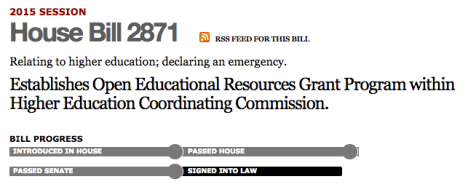OER action around the state
It’s a hot moment for the open education movement in Oregon. Over the past 5 years, I’ve worked on OER (open educational resources) initiatives at two colleges now — Lane Community College and now at Portland Community College — and, finally, it feels like there is statewide momentum. At many institutions, libraries are leading the way to more affordable education by helping instructors replace expensive course materials with open or library-provided materials. ACRL-OR has already honored one great project out of CGCC, and many other colleges are working on similar initiatives.
Here at PCC, we’re proud to report that open and low-cost materials are already saving students over $70,000 per term, but we’re pressing to do more. Our OER Steering Committee, which I co-chair with our fantastic colleague, Rachel Bridgewater, has set a goal to save students 1 million dollars by fall 2017. We currently have 3 PCC teams who received state funding from openoregon.org in math, reading, and health, and I’m working to prep folks to apply for the second round of funding, which should be announced later this fall.
In other big news, over the summer, the Oregon legislature passed a bill, HB 2871, which:
- funds 2 OER positions within HECC
- requires HECC to identify OER for 30 transferable, high-enrollment courses
- funds OER “grant programs” for Oregon colleges and universities
- requires Oregon colleges and universities to label “low cost or no cost” courses in their catalogs and schedules
Wow. There’s a lot packed in there, and we’ve got our work cut out for us, but, here at PCC, we’re hopeful that this means more productive funding and OER energy from the state.
Meanwhile, back at PCC, I’m grateful to have such wonderful librarian colleagues who have been helping interested faculty in their liaison areas explore OER. Especially at such a large institution, it really takes a village to get any traction. We’ve got faculty in many disciplines experimenting, and some who have used open resources for years, but many are still skeptical. This year, I am going to continue to reach out to faculty, especially in high-enrollment transfer classes where many open options already exists (check out the University of Minnesota’s Open Textbook Library for a start). If we can get just one or two of those courses to switch from a traditional textbook to an open one, the potential student savings would be huge, and faculty in other areas would have a local model to build upon.
Is your institution exploring or creating OER? How are you involved?
